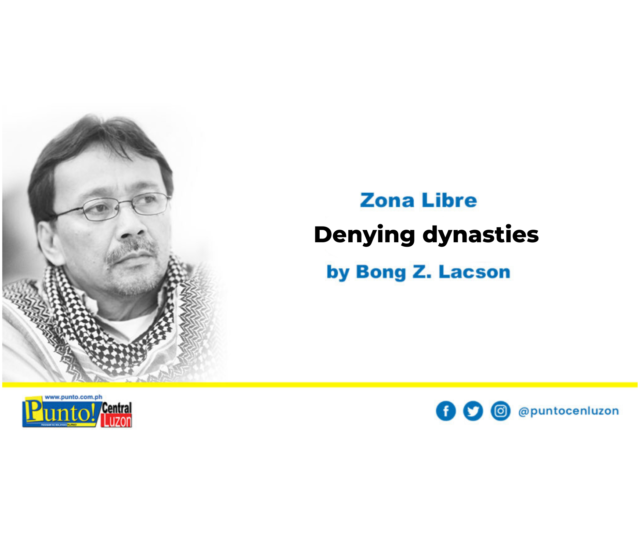IT COULD not have transitioned to anywhere else. All that presidential blabber about dismantling the oligarchy naturally flowing to a confluence with the current of dynasties, political, as a matter of course.
Postulated Sen. Franklin Drilon: “The lack of an anti-dynasty system or provision in our system would allow oligarchy to continue... Oligarchy is bad for our governance, and therefore, as a policy, yes, we should adopt policies to prevent or dismantle these oligarchies.”
If only to impress the imperative of the task at hand, Drilon expressed willingness to cross political lines “to sit down with whoever the administration designates to work on and examine all laws, especially in governance, in order that the opportunity for oligarchy will be removed or minimized.”
Emphasizing: “One of those is the lack of anti-dynasty law.”
Anti-dynasty law. So, how many times has this been pushed in Congress, only to be pulled out, if not fall by the wayside, at each try?
Here’s a take nearly seven years ago, Nov. 25, 2013 to be exact, in this same corner – A voice most ungodly:
“TODAY IS a historic moment, if only because for the first time, this was approved at the committee level.”
So declared Bayan Muna party-list Rep. Neri Colmenares of Nov. 20, 2013, the day the Anti-Political Dynasty Bill (APDB) was approved – unanimously – by the House committee on suffrage and electoral reforms.
A consolidation of three bills, the approved measure seeks to prohibit relatives up to the second degree of consanguinity to hold or run for both national and local office in “successive, simultaneous, or overlapping terms.”
It also provides for the Commission on Elections to decide through lottery who in the clan would be permitted to run in the election in case none of the candidates in the same family refuses to withdraw.
The first attempt to legislate a solution to what has been deemed the scourge of Philippine politics was 18 years ago, a fact all too clear to those who are now ecstatic over the passage of the bill, if only at the committee level.
“The State shall guarantee equal access to opportunities for public service, and prohibit political dynasties as may be defined by law.” So, it is enshrined in Article II Section 26 of the 1987 Constitution.
All attempts to just cobble an enabling law, aborted at their very conception, the legislative bodies as much dynastic in their composition as the other layers of government.
So, what difference will it make this time?
“Power, both economic and political should not be held by just a few. We need to give a chance to others who are equally capable but do not have the opportunity.”
Estrada
So spake eloquently Senator JV Ejercito, author of the Senate version of the APDB, his motives readily suspect given his being a dynast himself: son of the deposed, convicted, pardoned President Joseph Estrada, now mayor of Manila, and former actress Guia Gomez, now mayor of San Juan; half-brother to Senator Jinggoy Estrada and uncle to the latter’s daughter, San Juan Councilor Janella Ejercito Estrada; cousin to Laguna Governor ER Ejercito and Quezon Province Board Member Gary Estrada.
Matter-of-factly thus, JV conceded that passing an anti-political dynasty law “may not be an easy legislative task.”
“I’d like to make a stand as me because I’m after all the leader of everybody here and I want to be as hands off as possible and not try to push anybody. I’m in favor of it…I’m in favor of it if only because the Constitution says it.”
Circuitous locution on the APDB there from House Speaker Feliciano Belmonte Jr. constrained as he is with a dynasty of his own: only daughter Josefina aka Joy is the incumbent vice mayor of Quezon City, nephew Jose Christopher aka Kit is the city’s 6th district representative.
“I want to put it on record that if there’s, let’s say, a situation where it’s either she or me, I will yield...Let the youth take over.”
That situation’s long time passing, Sir.
“I believe (APDB) will experience rough sailing but you know, Rome wasn’t built in a day. We have already put up a big stone. It already passed in the committee level and I think that is something to be happy about but it’s still a long way.”
Belmonte dishing out a consuelo de bobo.
Binay
Senator Nancy Binay though takes to a different application of the anti-dynasty measure. Rather than family members in elective positions – being there by the sovereign will of the people and divine grace, it is those in appointive positions – merely serving at the pleasure of the powers-that-be, that should be subjected to the anti-dynasty scrutiny.
Binay says: “Dapat mas bantayan natin yung appointing members of one family in key and high positions of government.” A not-so-cloaked reference to the Abads in positions of power — Budget Secretary Butch Abad whose daughter Julia is head of the Presidential Management Staff. Not to mention his wife, Henedina representing the lone district of tiny Batanes but reportedly getting more priority development assistance funds than House Speaker Belmonte.
No hypocritical civility but in-your-face bluntness becomes Binay when, invoking the supreme law of the land, she argued the APDB “may limit what the Constitution says about who can run.”
Articulating thus: “…if the person is elected then that is already the voice of the people. And what is the constitution about but the voice of the people. So why deprive the people of their voice.”
And went a step higher to lay her case before the supreme being: “It may also go against the principle of vox populi, vox Dei.”
The voice of Makati, most precisely, given the premier city’s being a Binay fiefdom since the Marcos ouster, breeding the current Vice President of the Philippines who was many times city mayor, his wife who was once mayor, his son who is current mayor, his other daughter who is representative of the city’s second district and this senator daughter.
Ganyan sila sa Makati, ganyan din sa buong Pilipinas.
A matter of vox Makatii, vox dei there to me. As the voice of the people Binay referred to may well be the voice – not of God – but of their gods. Their god of goons, their lord of numbers, their lord of celluloid illusion, at one time their glorious goddess of the tapes, and of currency, the almighty epal.
Hear then this caveat all the way out of the 8th century from the English scholar and theologian Alcuin: “And those people should not be listened to who keep saying the voice of the people is the voice of God, since the riotousness of the crowd is always very close to madness.”
Yeah, most fitting to the Philippine praxis of democrazy.
INDEED, SO how fare today the dynasts referenced in this piece?
Not one of the Estradas survived the elections of 2019, losing even the family’s political heirloom that was San Juan.
The Abads long wiped out too, coterminous as they were with their patron, the BS Aquino III.
The Belmontes still have Joy in QC and Kit in the House.
Of the Binays, Nancy still sits in the Senate and Abby is inheritor of Makati, triumphant over brother Jun-Jun in a bitter sibling rivalry. Jejomar, failing in his presidential run in 2016 and in his congressional try in 2019.
So, how many other political families were deprived of their long–held turfs in 2019 alone?
And how many have survived, indeed, even enlarged their domain?
Come easily to mind here: Duterte, Cayetano, Villar.
Which only goes to show that dynasties rise and fall on their own merits, or lack thereof. The people – enlightened and resolute – ultimately deciding their fate, denying their perpetuity.
No, I am not the least implying there’s no need for any anti-dynasty law.
I am just leaning on the pragmatic side of thingspolitical here.





